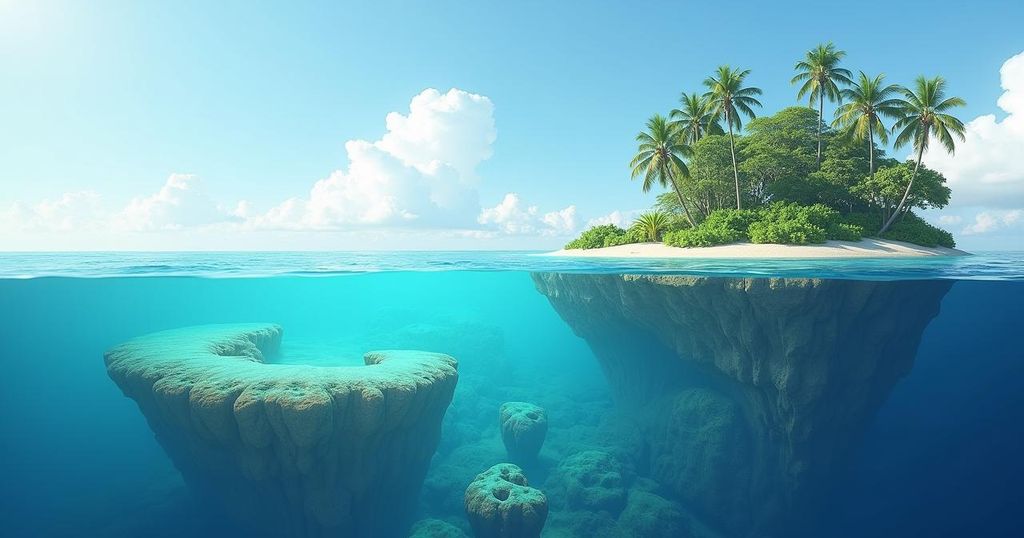U.N. Calls for Global Action as Pacific Nations Face Rising Sea Levels
U.N. Secretary-General Antonio Guterres has issued a grave warning regarding the accelerating crisis of rising sea levels, particularly affecting Pacific island nations, during his visit to Samoa and Tonga. The U.N. and World Meteorological Organization’s reports reveal that the Southwestern Pacific faces significant sea level rises, primarily due to climate change and ice melting. Guterres emphasizes the urgent need for global action to mitigate emissions and support vulnerable nations, as many Pacific communities are increasingly affected by flooding and environmental loss, despite contributing minimally to global emissions.
United Nations Secretary-General Antonio Guterres has sounded an urgent alarm regarding the escalating crisis of rising sea levels, particularly affecting vulnerable Pacific island nations. He appeals for global action under the phrase “save our seas,” in light of reports released by the United Nations and the World Meteorological Organization that indicate a rapid increase in sea levels, primarily driven by climate change and the accelerated melting of ice sheets. During his recent visit to Samoa and Tonga, Guterres addressed the Pacific Islands Forum, where he highlighted the dire implications of rising waters and related climate phenomena, such as ocean acidification and marine heat waves. Guterres noted, “This is a crazy situation. Rising seas are a crisis entirely of humanity’s making.” The reports reveal that sea levels in regions like Tonga have increased significantly, surpassing the global average, with Nuku’alofa experiencing a rise of 21 centimeters (approximately 8.3 inches) between 1990 and 2020. This crisis has profound implications for the populations of the Pacific islands, which predominantly reside within a few kilometers of these encroaching waters. The frequency of coastal flooding has significantly escalated in the region over recent decades, severely impacting communities. Guterres further emphasized that while the Pacific island nations contribute negligibly to global emissions, they face devastating consequences of climate change mainly produced by wealthier nations. He underscored the urgent need for substantial action to mitigate emissions and support those nations most affected. Guterres also pointed out the alarming trend of increasing natural disaster risks associated with rising sea levels, which is exacerbated by broader climate change dynamics. As he concludes his observations, he calls upon the international community to take responsibility and reverse trends contributing to systemic environmental decline, empowering impacted nations to advocate for proactive measures against climate chaos.
The issue of rising sea levels has become an increasingly pressing concern globally, particularly for Pacific island nations that are among the most vulnerable to the impacts of climate change. Rising sea levels can lead to devastating consequences, including coastal flooding, loss of land, and threats to freshwater supplies. The United Nations Secretary-General’s statements reflect coordinated assessments from climate reports highlighting significant changes occurring rapidly in the environment due to anthropogenic activities. The warming of the planet, primarily from greenhouse gas emissions, is causing glaciers and ice sheets to melt, resulting in higher sea levels. The Southwestern Pacific region has reported the most pronounced sea level increases, largely attributed to its geographical context and preceding climate dynamics. Communities in these areas face challenges to their livelihoods and cultural heritage as environmental changes escalate. With the upcoming session of the United Nations General Assembly focused on these critical issues, the voices of Pacific nations stand as poignant reminders of the urgent steps necessary to combat climate change and protect vulnerable populations.
In conclusion, the warning directed by Secretary-General Antonio Guterres underscores the critical urgency surrounding the climate crisis and rising sea levels, especially for Pacific island nations. His call for global action reflects a necessity for collective responsibility among nations, particularly those contributing most significantly to climate change. The data presented in international reports conveys a stark reality for communities at the frontlines of environmental degradation, necessitating immediate and effective measures to mitigate the worsening impacts of climate change to avoid further sacrificial loss of lives and cultures.
Original Source: www.voanews.com




Post Comment